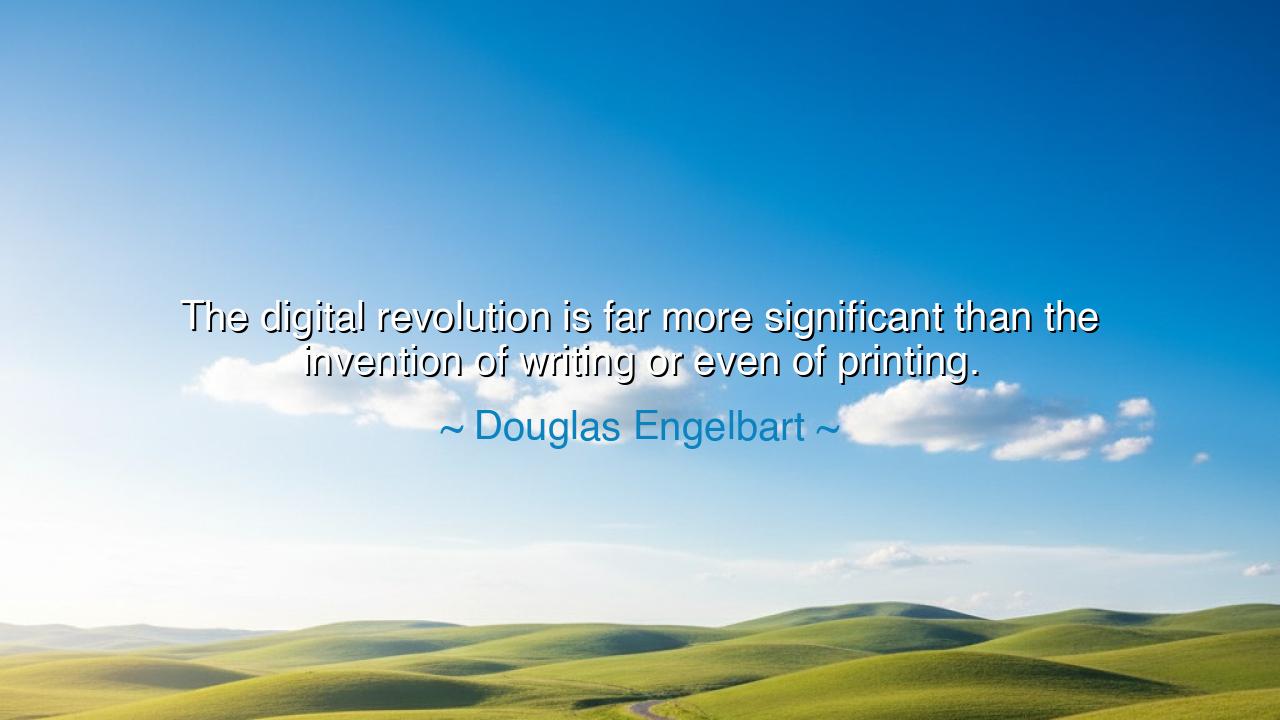
The digital revolution is far more significant than the invention
The digital revolution is far more significant than the invention of writing or even of printing.






Douglas Engelbart’s words, “The digital revolution is far more significant than the invention of writing or even of printing,” are a profound reflection on the immense impact of the digital age—a time where the tools we have created are shaping not just how we live, but how we think, interact, and even define our humanity. To understand the weight of Engelbart’s statement, we must first look back at the inventions that have shaped human civilization. The invention of writing was a transformative leap for mankind, allowing us to capture and transmit knowledge across generations. The printing press, some centuries later, multiplied this power, enabling the spread of ideas to reach millions. Yet, Engelbart contends that the digital revolution—the age of computers, networks, and virtual worlds—holds significance that outstrips these earlier breakthroughs. It is a revolution not just in communication but in the very fabric of our existence.
In the ancient world, the creation of writing was viewed as a gift of divine power, one that connected the human to the gods. Cuneiform in Mesopotamia and hieroglyphics in Egypt were more than just ways to keep records; they were gateways to wisdom, history, and the eternal. These early systems of writing allowed humanity to preserve knowledge, shape societies, and lay the groundwork for future generations. But writing was still a linear process—an inscription of thoughts in symbols upon clay, stone, or parchment. Similarly, the invention of the printing press in the 15th century by Johannes Gutenberg marked an era of unprecedented expansion of knowledge. Books, once rare and accessible only to the elite, could now be mass-produced, allowing for the widespread dissemination of ideas. This was a revolution in itself, shaping the Renaissance, the Enlightenment, and the rise of the modern world.
Yet, Engelbart’s digital revolution takes us beyond these earlier innovations. Writing and printing transformed how humans recorded and shared knowledge, but the digital revolution is transforming how knowledge itself is created, processed, and interacted with. The internet, for example, does not just allow for the sharing of knowledge; it enables instantaneous access to an unfathomable expanse of information. In this digital realm, one can interact with knowledge as a living organism, changing it, challenging it, and building upon it in real-time. This dynamic exchange is more than just communication; it is a collaboration of minds, a community of thinkers and creators, working together across time and space.
The ancient Greeks understood that knowledge was not just something to be recorded but to be lived and shared. Socrates was known for his dialectic method—a way of exploring truth through conversation and debate. In this method, the individual came to understand by interacting with others and challenging assumptions. The digital revolution echoes this ideal, but it amplifies it to a degree that the ancients could scarcely imagine. Today, we have the ability to engage in global dialogues, connecting with individuals from all corners of the world to share ideas, solve problems, and explore new possibilities. The digital space allows for the instantaneous exchange of information that was once unimaginable, thus creating a new paradigm of intellectual growth and participation.
Consider the story of Alan Turing, the mathematician and cryptanalyst whose work laid the foundation for modern computing. Turing’s invention of the universal machine was not merely a theoretical concept—it was a realization of the potential for machines to mimic human thought. His work signaled the beginning of the digital revolution, a revolution that would eventually lead to the creation of the internet, personal computers, and the connectivity we experience today. Turing’s insight that machines could not just calculate numbers, but process ideas and perform tasks, marked the birth of a new age—an age where the boundaries of human thought were extended by the machines we created. Engelbart’s digital revolution is a natural extension of Turing’s vision, a world where technology and thought are no longer separate but interwoven into a single, dynamic system of creation.
The significance of this digital revolution lies not just in the technology itself, but in how it is reshaping society. It is no longer enough to merely record knowledge; we now have the ability to create and recreate knowledge, to connect and collaborate, to build and transform the very way we understand the world. Engelbart’s insight reminds us that the true power of this revolution is not in the tools themselves, but in how we use them to create a new world—one where ideas, not just information, drive progress and innovation.
Lesson for the ages:
The digital revolution is not merely a continuation of past innovations; it is a paradigm shift in how we interact with the world. Just as the ancients revered the power of written word and printed knowledge, we must now recognize the potential of digital tools to not only preserve and share knowledge, but to create new forms of collaboration, participation, and growth. The future is not just about using technology to perform tasks more efficiently; it is about using technology to empower individuals and communities to think, create, and grow in ways that were once beyond our reach.
Practical Action:
As you navigate the digital age, remember that the true power of technology lies in how you use it. Engage with the digital world not just as a tool for consumption, but as a platform for creation. Use the internet, social media, and computing not only to access information, but to build, share, and innovate. The digital revolution offers a world where collaboration, knowledge, and progress are within reach, but it is up to you to shape how these tools are used. Let technology be a means to expand the boundaries of what is possible, just as the ancients used their innovations to expand the frontiers of thought, art, and civilization.






AAdministratorAdministrator
Welcome, honored guests. Please leave a comment, we will respond soon